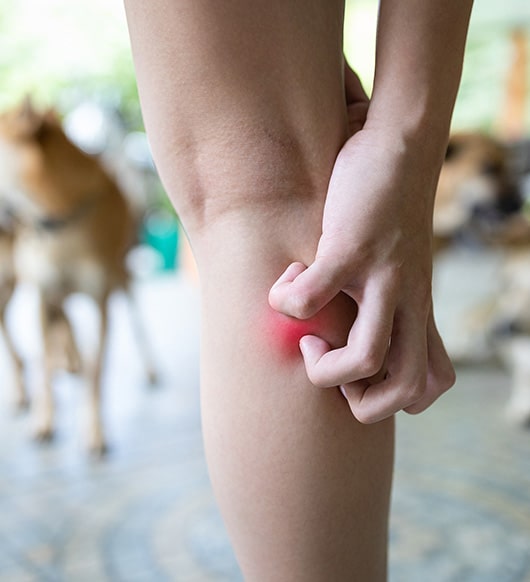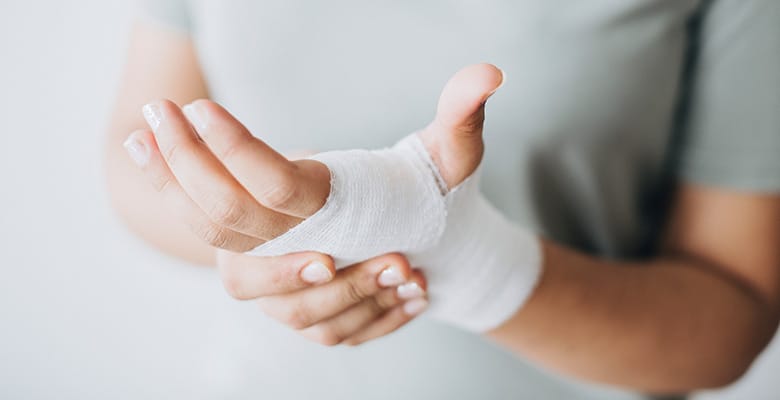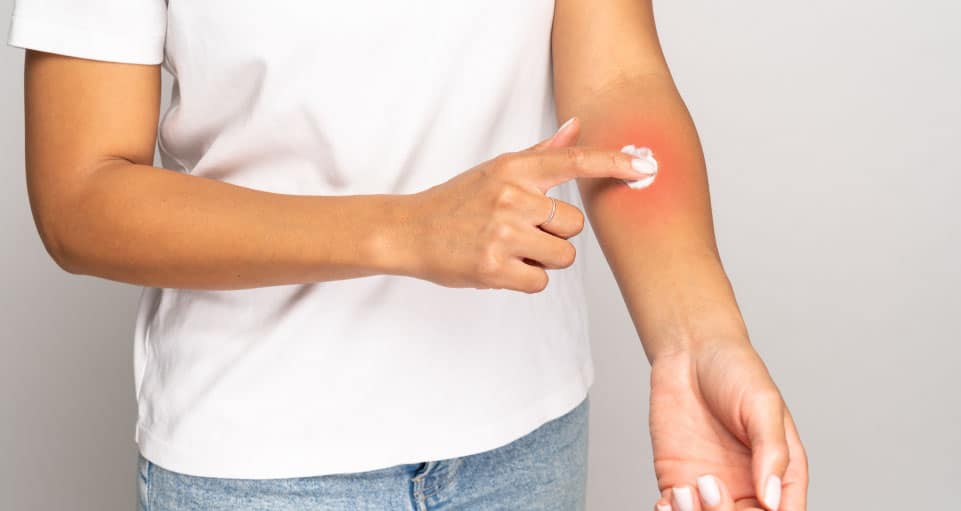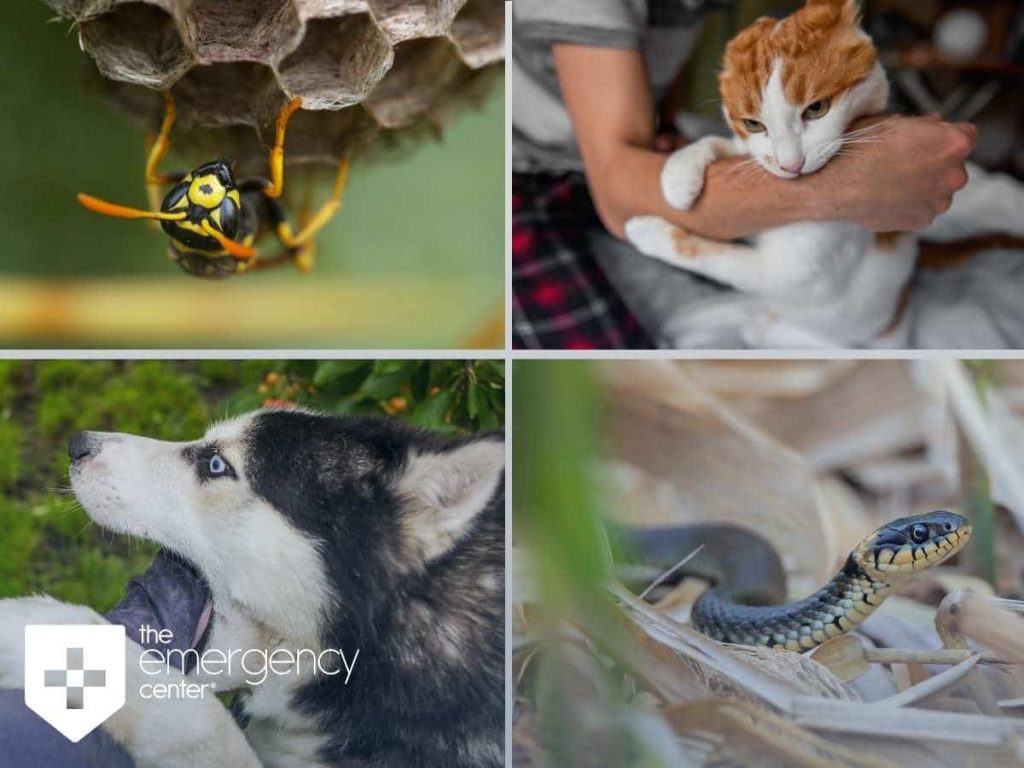Emergency Treatment for Animal and Insect Bites
You should seek emergency treatment for animal and insect bites and stings, because you may be at risk for infection or have a severe reaction.

Animal Bites
Most animal bites that are more than just a scratch require emergency care because of their high risk of infection. If the animal was a wild animal or stray, regardless of the severity of the injury, there are additional risks that require immediate evaluation. If the animal’s owner is available, be sure to ask if the animal’s rabies shots are up-to-date.
Seek prompt medical attention if:
-
Wound is a deep puncture
-
Skin is badly torn or crushed
-
Blood spurts from wound
-
Bleeding is severe
-
Can’t be stopped after 15 minutes of firm and steady pressure
-
Redness, inflammation and fever after injury
-
May indicate an infection
You should also seek emergency care if there is a concern for rabies, if you haven’t had a tetanus shot in the past 5 years, and if you have a weakened immune system from diabetes, liver disease, cancer, HIV infection or medications.
What Can You Do?
While you are waiting for medical treatment, you can:
-
Call 911 for deep wounds and excessive bleeding
-
Wash the bite area with soap and water
-
Apply pressure with sterile gauze or a clean cloth
-
Apply antibiotic treatment if bleeding has stopped
-
Cover area with a bandage or sterile gauze
-
Offer acetaminophen or ibuprofen for pain

Insect Bites
Many reactions to insect bites and stings are mild, causing little more than redness, itching, stinging or minor swelling. Occasionally, insect bites and stings, such as from a bee, a wasp, a hornet, a fire ant or a scorpion, can result in severe reactions.
The most serious symptoms associated with insect bites and stings include:
Allergic Reaction
If your throat feels like it is closing up, and you develop a rash on your skin or you feel your face swelling up, it is a sign that your body is having a severe reaction to an insect bite.
Fever and Chills
If your temperature rises noticeably after an insect bite, you should go to an emergency room (ER) right away. Fever can develop, for example, in response to tick bites, and may cause a serious infection like Rocky Mountain Spotted Fever.
Breathing Difficulties
Any breathing difficulties after an insect bite should be responded to immediately. If you are experiencing shortness of breath, wheezing or tightness in the chest, it could be a sign of a serious reaction.
-
Swelling of the lips, eyelids or throat
-
Dizziness, faintness or confusion
-
Rapid Heartbeat
-
Hives
-
Rash and itching
-
Nausea, cramps or vomiting
Also note that children who have been stung by a scorpion should get immediate emergency treatment.

What Can You Do?
While you are waiting for medical treatment, you can:
-
Call 911 if there are no signs of breathing or swelling of the lips or tongue.
-
Don’t offer anything to drink.
-
Loosen tight clothing.
-
Cover the person with a blanket.
-
Turn the person to the side if vomiting to prevent choking.
-
Have the person take an over-the-counter antihistamine (as directed on bottle), if possible.
-
Check for special medications, like an EpiPen, to treat a severe allergic reaction and prevent anaphylactic shock.
Sources
- https://www.cdc.gov/rmsf/pdf/RMSFInfographic.pdf
- https://www.medexpress.com/services-and-treatment/bites-stings.html
Recent Blog Post
What Our Patients are Saying About Us
My visit to the emergency center of San Antonio was amazing. I was seen right away for sciatica pain. Dr. Styskal was amazing. I was treated right away and sent home with my medication. I wish more facilities would practice this without you having to make an additional stop at a pharmacy for medication. I know five stars is the highest I can give but they deserve 100+ stars.
Lizette M. ★★★★★
I was skeptical about going to the Emergency room, because for me ER’s have a bad reputation. My experience here was one of the best experience I’ve ever had. Keith at the front desk was very nice and went above and beyond for me. I forget my insurance card and wanted to know how much my co pay would be. He looked me up with no issue, brought my a wheelchair to ease my pain, as well as started
Mecia T. ★★★★★
My first time coming here, was greeted immediately by Keith and Debbie and helped. When in the back, Nichole wasted no time getting my vitals, checking on how I was feeling, and was super friendly and comforting while doing so. Dr. Erdner was very nice, and informative. Johnny got my CT scan quickly and made the process easy, and fast. All together the staff made my visit a great experience.
Nicole D. ★★★★★

